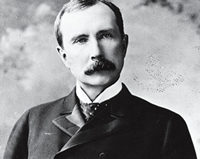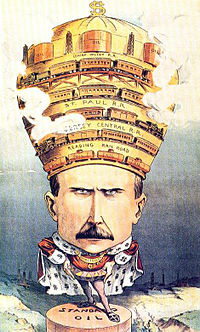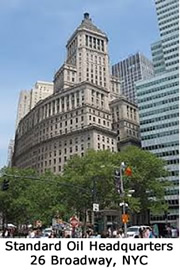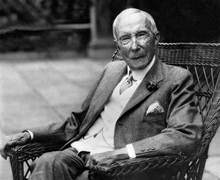“The Richest Man in the World”—John D. Rockefeller, Sr.
Copyright © 2017, Henry J. Sage

John D. Rockefeller, Sr., is best known as head of the Standard Oil Company and one of the richest men in the world. He was born in Richford, New York, in 1839 and moved with his family to Cleveland when he was 14. His father William Rockefeller was what we would today call a con artist who roved the country foisting various “snake oil” type products on the masses, but his mother was a devout, pious woman of high morals. Later in his life, William Rockefeller's son would become embarrassed when knowledge of his father's shady activities became public. John D.’s embarrassment over his father's shady activities contributed to his natural inclination to keep the private details of his life hidden from public view.
John D. began working hard even as a teenager, and by the time he was 20, with the aid of a loan from his father, he started his own business in selling commodities. With his innate industriousness and his keen sense of how to operate a profitable enterprise, Rockefeller's business became immediately successful. With the money he earned from his early success, he turned his attention to the oil business, which he found interesting and possibly quite profitable. For years whale oil was the source of fuel for lamps used in lighting homes, but the discovery of oil in Titusville, Pennsylvania, soon supplanted that source. Rockefeller opened his first refinery in 1863, and like his previous business, it was also an immediate success. As he had predicted, the oil business grew and prospered, and with his partners he created the Standard Oil Company in 1870. Like his previous ventures, Standard Oil quickly became one of the most successful and prosperous business corporations in America. Rockefeller himself oversaw the details of his company, which was managed very efficiently. Its growth soon enabled Rockefeller to begin purchasing competing oil companies.
The tactics that Rockefeller used to acquire those new entities were clearly ruthless, but at the time, such tactics were simply seen as fair business practice. Today those methods would be judged as illegal, if not immoral, but at the time there were a few laws on the books to confront businesses like Standard Oil. Although the growth of standard oil generated a series of lawsuits in various states, successful government intervention into the huge growing oil and other industries would have to wait for the Progressive Era. Rockefeller opened new refineries in areas into which he wanted to expand, and with his enormous resources, he would sell kerosene and other oil products at prices well below those of his competitors, willing to accept losses long enough to drive them out of business. When those companies were no longer able to survive in the face of Rockefeller’s hard-nosed methods, he would purchase them, often for less than they were originally worth, and incorporate them into his growing Standard Oil empire. Standard Oil soon became the first real monopoly in America. Despite the claims of Standard Oil's critics, Rockefeller employed over 100,000 workers, and he claimed that he treated them quite well.
When Rockefeller first began his oil business, whale oil was used in homes for lighting. Although the growing use of electricity for lighting reduced that demand, Rockefeller still sold kerosene for use in the home for lighting and cooking. The burgeoning automobile industry soon generated a new need for oil—converted into gasoline—as a source of fuel. The rapid expansion of the young automobile industry helped Rockefeller's wealth grow enormously. Although his ruthless methods undermined his competitors, the result was widely available lighting and heating oil at cheap prices for people all over the country.
Always an innovator, Rockefeller soon determined that a great deal of the byproducts of oil refining were generally discarded, since they were of no apparent economic value. But he understood that those byproducts might have other uses, and he began to convert them into paraffin wax, various kinds of petroleum jellies and lubricating oils. Those products became popular and produced a nice profit for the company, at the same time increasing the amount of product that the Rockefeller refineries were shipping by railroad.
Control of the Railroads. The size and power of the Standard Oil Company was such that Rockefeller was able to exert pressure on railroads to let him ship his oil at prices below what those rail lines charged his competitors. Another tactic he used was to buy up all the available railroad cars used in transporting oil,  which made it difficult for his competitors to store their product, forcing them to sell their excess oil to Standard Oil at a cheap price. He also bought up all the available chemicals that were necessary to refine oil.
which made it difficult for his competitors to store their product, forcing them to sell their excess oil to Standard Oil at a cheap price. He also bought up all the available chemicals that were necessary to refine oil.
By controlling railroad traffic, Rockefeller was able to ship oil all over the country profitably. Rockefeller then gathered together all his subsidiary companies into the Standard Oil Trust, the first entity of its kind in the country. The efficient methods of production used in his refineries streamlined the entire oil industry, and his growing wealth paved the way for his movement into philanthropic endeavors.
Attacks on Rockefeller's abuses began in the 1880's. Henry Demarest Lloyd wrote a series of articles about Standard Oil, the “Great Monopoly,” that eventually became a widely read book, Wealth Against Commonwealth. Lloyd wrote that Rockefeller was undermining the American nation through his huge economic force. “Liberty produces wealth, and wealth destroys liberty,” Lloyd claimed. He called Rockefeller a “czar of plutocracy” who worshiped his own financial power over mankind. Wealth Against Commonwealth was widely read and was described by critics as an eloquent indictment of capitalism. The focus of his argument was his case against the idea of social Darwinism. He claimed that applying the theory of survival of the fittest to the business world was nothing but a monstrous.
Lloyd was but one of a number of journalists who became known as the muckrakers who rose in protest against violations of the law and serious breaches of ordinary social ethics and business practices. The largest newspaper in America at the time, the New York World, called Standard Oil “the most cruel, impudent, pitiless, and grasping monopoly that ever fastened upon a country.” As historian Page Smith wrote in The Rise of Industrial America (New York: McGraw-Hill, 1984), John D. Rockefeller, Sr.’s tactics in expanding his standard Oil Company “were the buying up and squeezing out of rivals by every device at hand—legal or illegal—until Standard Oil had acquired at least seventy-four refiners and controlled more than 90% of the oil production of the country.”
Among the most successful attacks on Standard Oil was the one mounted by Ida Tarbell, one of the leading muckrakers. Her father had been driven from the oil business by the kind of practices in which Rockefeller engaged. She began writing a series of articles for McClure magazine, one of the leading critical journals of the period. Those articles were eventually combined into Tarbell’s History of the Standard Oil Company.
Despite cries for the harnessing of the power of the wealthy capitalists, the Episcopal Bishop of Massachusetts, William Lawrence, argued that distrusting the morality of people based on their prosperity was in error. He sought no inherent harm in the accumulation of wealth, nor did he believe that the effects the accumulation of wealth undermined public morality. He wrote, “godliness is in league with Riches.” Subsequent donations by wealthy capitalists enabled him to build Trinity Church in Boston, demonstrating that capitalism and religion could exist side-by-side. Bishop Lawrence was not alone among ecclesiastics in seeing no evil and material success.
Government Steps In. Attempts by state attorneys general to control Standard Oil were unsuccessful, but the Sherman Antitrust Act passed in 1890 was the first major step by the federal government to control large corporations that seem to be preying on smaller competitors. Several early cases brought under the act were unsuccessful, but under presidents Theodore Roosevelt and William Howard Taft, the act was enforced more vigorously. In 1911, the Standard Oil Company of New Jersey was convicted for violations of the Sherman Act by monopolizing the oil industry through unfair practices that harmed its competitors. Standard Oil was broken into 34 smaller companies, a number of which have survived to this day. The new, smaller companies were still worth a great deal, and they continued to prosper on their own. Ironically enough, Rockefeller himself did not suffer financially: his return from the smaller companies only increased his wealth. Soon after the case, he created the Rockefeller foundation with $100 million of his own money.
The federal government also took note of the unethical practices of railroads by passing the Interstate Commerce capital act in 1887. The essence of the act was to force railroads to charge equal rights to all of their users, and to outlaw practices like rebates—discounts paid to powerful entities like Carnegie Steel and Standard Oil, as well as the even more in the nefarious practice of powerful companies known as drawbacks, forcing railroads to pay a portion of the rates paid by others to the largest users. By that time, however, Rockefeller was moving much of his oil through pipelines.
The strain of the lawsuits and his intense work in managing his company led Rockefeller to pull back from his heavy engagement in the operation of Standard Oil. His health had suffered, and he decided to concentrate more on philanthropy. Although ruthless in business, he was a deeply religious man, a Baptist who  followed his mother’s face. One biblical principle that he followed was that when he did good works for others, he was supposed to do it in secret. The fact that he conducted his charitable efforts in secret did nothing to enhance his public reputation as little but a predator. He retired to his well-guarded estate in Pocantico Hills, New York, about 30 miles north of New York City, and the Standard Oil headquarters at 26 Broadway, a building that stands to this day.
followed his mother’s face. One biblical principle that he followed was that when he did good works for others, he was supposed to do it in secret. The fact that he conducted his charitable efforts in secret did nothing to enhance his public reputation as little but a predator. He retired to his well-guarded estate in Pocantico Hills, New York, about 30 miles north of New York City, and the Standard Oil headquarters at 26 Broadway, a building that stands to this day.
As in his business practices he sought the most efficient way to help people in need. He felt that simply giving money to the poor was not the best way to put his wealth to use. He was intensely interested in and supportive of education. He founded the Atlanta Baptist Female Seminary and invested $80 million in the University of Chicago. He also started Spelman College in Atlanta, a free University for young African-American women in the South. His personal engagement with the college can be seen in the fact that his wife’s maiden name was Spelman. He also was a proponent of using science to advance the cause of medicine, and in nineteen oh one he created the Rockefeller Institute for Medical Research. He supported a research hospital to attack hookworm and yellow fever, diseases widespread throughout the South. Throughout his life Rockefeller contributed more than $530 million to charitable causes.
John D. Rockefeller, Sr., has been described as a completely self-made man who possessed strategic brilliance and used a combination of ruthless business tactics to amass his wealth. This complex individual also had a passion for philanthropy, suggesting that the conscience instilled in him by his pious mother might have prompted him to use that wealth for the benefit of society. Although Rockefeller no doubt suffered from the criticism leveled against him in the press, he seems to a believed that his practices were actually beneficial for American business, weeding out those who could not compete successfully in the dynamic marketplace of American capitalism and replacing them with those who could operate more efficiently. Those he drove out of business would no doubt have quarreled with those conclusions, but there is no question that he revolutionized American business practice.
Author Ron Chernow's 1998 book Titan: The Life of John D. Rockefeller, Sr., (New York: Random House) is considered among the finest biographies ever written by an American author. The New York Times called it "a triumph of the art of biography." Kirkus reviews called Chernow's book "business biography on  a grand scale." (Another of Chernow's books, The House of Morgan, about another famous robber baron, John Pierpont Morgan, won the National Book Award.)
a grand scale." (Another of Chernow's books, The House of Morgan, about another famous robber baron, John Pierpont Morgan, won the National Book Award.)
Chernow covers every detail of Rockefeller's career, including the South, improvement, company, which was used by Rockefeller's Associates to gain favorable rates on the railroads. He not only received rebates on his own shipping costs, but "another forty cents for every barrel shipped ... by competitors!" (p. 136.) The biography also details the path by which critic Ida Tarbell zeroed in on Rockefeller's enterprise. Chernow says that the series of articles Tarbell wrote for McClure's magazines "remains the most impressive thing ever written about standard oil--a tour de force of report ties that dissects the trust's machinations with withering clarity." (p. 443.)
In his concluding chapter Chernow writes that “Rockefeller's stewardship of standard oil had signaled a new era in American life that had both inspired and alarmed the populace. His unequaled brilliance and rapacity as a businessman had squarely confronted the country with troubling questions about the shape of the economy, the distribution of wealth, and the proper relationship between business and government. Rockefeller perfected a monopoly that indisputably demonstrated the efficiency of large-scale business. ... But in so doing he also exposed the manifold abuses that could accompany untrammeled economic power, especially in the threat to elected government.” He also adds, however, that “The fiercest robber baron had turned out to be the foremost philanthropist. ... He established the promotion of knowledge, especially scientific knowledge, as a task no less important than giving alms to the poor or building schools, hospitals, and museums.”
Additional Resources On Rockefeller
- Collier, Peter and Horowitz, David. The Rockefellers: An American Dynasty. New York: Holt, Rinehart & Winston, 1976.
- Manchester, William. A Rockefeller Family Portrait: From John D. to Nelson. New York: Little, Brown, 1958.
- Nevins, Allan. John D. Rockefeller: The Heroic Age of American Enterprise. 2 vols. New York: Charles Scribner's Sons, 1940.
- Nevins, Allan (1953). Study in Power: John D. Rockefeller, Industrialist and Philanthropist. 2 vols. New York: Charles Scribner's Sons.
- Tarbell, Ida M. The History of the Standard Oil Company. 2 vols. Gloucester, MA: Peter Smith, 1963. [1904]
- The Wikipedia Page on Rockefeller
- The Wikipedia Page on Standard Oil
- The Encyclopedia Britannica page on Rockefeller
- The Rockefeller Family
| Gilded Age Home | The American West | The Industrial Revolution in America | Gilded Age Politics | Updated April 20, 2017 |